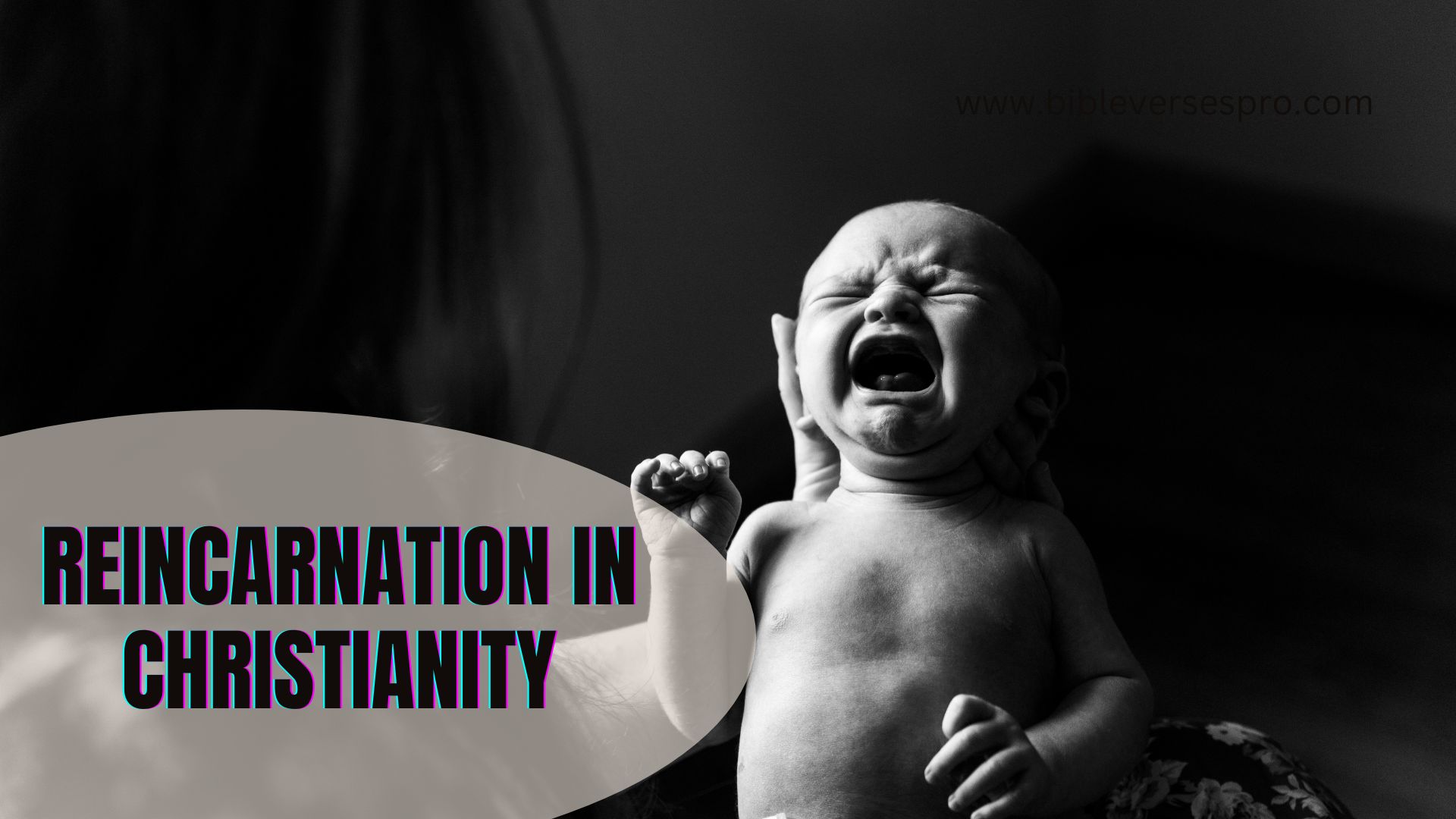Reincarnation, the belief that the soul is reborn into different bodies after death, is often associated with Eastern religions like Hinduism and Buddhism.
However, some lesser-known aspects of Christianity also hint at the possibility of reincarnation.
While it’s essential to recognize that this belief is not mainstream within Christian doctrine, there are historical and biblical references that have sparked discussions on the subject. In this article, we’ll explore 15 facts about reincarnation in Christianity.
Reincarnation In Christianity
Join us as we delve into the lesser-known corners of Christian history and scripture, seeking to shed light on the ancient discussions and reflections that hint at the potential for a cyclical journey of the soul within the context of this prominent world religion.
While not universally accepted, the exploration of reincarnation in Christianity offers a unique perspective on the ever-evolving nature of religious thought and the eternal quest to comprehend the mysteries of life and the afterlife.
1. Early Christian Beliefs:
During the formative years of Christianity, the religion was marked by a diversity of beliefs and interpretations.
Some early Christian thinkers, such as Origen (c. 185–254 AD) and Gregory of Nyssa (c. 335–395 AD), engaged in theological speculation about the soul’s journey,
suggesting the possibility of reincarnation as a way to reconcile God’s justice with the unequal distribution of suffering and prosperity in the world.
2. Pre-existence of Souls:
The notion of pre-existence posits that souls existed before being born into physical bodies.
This idea can be traced back to ancient philosophers like Plato, who believed in the immortality of the soul and its pre-existence in a realm of Forms.
Early Christian thinkers, influenced by Platonic thought, also explored the concept of pre-existence, proposing that the soul’s fall into the material world was a result of sin or divine purpose.
3. Secret Teachings:
The existence of “hidden” or “secret” teachings attributed to Jesus emerged through early Gnostic Christian sects.
Gnosticism, a diverse group of religious movements, often incorporated elements of mysticism, esoteric knowledge, and the concept of reincarnation.
The Church Fathers considered these teachings unorthodox, leading to their exclusion from the canonical texts.
4. Karmic Retribution:
Karma, a concept associated with Eastern religions, refers to the law of cause and effect, where one’s actions have consequences that affect future lives.
Some Christians explored parallels between karma and biblical teachings on divine justice, proposing that God’s judgment and rewards are distributed over multiple lifetimes.
5. John the Baptist as Elijah:
In the Gospel of Matthew, Jesus identifies John the Baptist as the reincarnation of Elijah, the renowned prophet of the Hebrew Bible (Old Testament).
This declaration raises intriguing questions about the possibility of other historical figures being reborn in different contexts.
6. Transfiguration Event:
During the Transfiguration event described in the Gospels, Jesus is transfigured before three of his disciples, and both Moses and Elijah appear with him (Matthew 17:1-13).
This incident sparked discussions about the continuity of these ancient figures’ souls and their potential incarnations.
7. The Blind Man’s Karmic Connection:
In the Gospel of John, the disciples inquire whether a man’s blindness was a consequence of his sins or those of his parents (John 9:1-3).
Jesus’ response neither confirms nor denies the concept of reincarnation but acknowledges the possibility of a karmic connection between a person’s past actions and their current circumstances.
8. Parables and Lessons:
Jesus frequently used parables to teach profound spiritual truths. Some of these parables, like the Parable of the Sower and the Parable of the Prodigal Son, symbolize the cyclical nature of life, death, and spiritual growth, paralleling themes found in reincarnation.
9. The Mystery of Christ’s Resurrection:
The resurrection of Jesus Christ is a central belief in Christianity, signifying his triumph over death.
While this event is distinct from reincarnation, it addresses the concept of life after death and the transformation of the soul into a glorified state.
10. Council of Constantinople:
The Second Council of Constantinople in 553 AD condemned the teachings of Origen, who supported the idea of the pre-existence of souls and reincarnation. This church council played a significant role in the eventual rejection of reincarnation as a mainstream Christian doctrine.
11. The Forgotten Doctrine:
As Christianity evolved into organized religion, certain theological ideas, including reincarnation, were gradually sidelined in favor of more orthodox interpretations.
The early explorations of reincarnation in Christian thought were eventually considered heretical.
12. Reincarnation in Modern Christian Thought:
In more recent times, certain Christian esoteric and New Age movements have reintroduced the concept of reincarnation.
Some individuals have sought to reconcile Eastern and Western spiritual beliefs, leading to a fusion of ideas in these fringe groups.
13. Diversity of Christian Beliefs:
It’s essential to recognize that Christianity encompasses diverse beliefs and denominations.
While the majority of Christians do not adhere to reincarnation, some fringe groups continue to embrace it as part of their theology.
14. Personal Interpretation:
The Bible’s complex and metaphorical language often leaves room for personal interpretation.
This ambiguity allows individuals to find support for their beliefs, including reincarnation, based on their unique understanding of scriptural passages.
15. Emphasis on Present Life:
Regardless of the debate around reincarnation, mainstream Christianity places emphasis on living a virtuous and loving life in the present, seeking salvation through faith in Jesus Christ, and following his teachings.
What Does The Bible Say about Rebirth?
The concept of rebirth or reincarnation is not explicitly mentioned in the Bible. The Bible primarily focuses on the belief in resurrection, which is the idea that the dead will be raised to a new life, either to eternal life with God or to judgment and condemnation.
Here are some key biblical points related to resurrection:
1. Jesus’ Resurrection: The most significant instance of resurrection in the Bible is the resurrection of Jesus Christ.
According to the New Testament, Jesus died on the cross and rose again on the third day, conquering death and offering the hope of eternal life to those who believe in Him (Matthew 28:5-7; 1 Corinthians 15:3-4).
2. General Resurrection: The Bible teaches about a future general resurrection, where all the dead will be raised to face judgment.
In John 5:28-29, Jesus states, “Do not be amazed at this, for a time is coming when all who are in their graves will hear his voice and come out—those who have done what is good will rise to live, and those who have done what is evil will rise to be condemned.”
3. Eternal Life and Judgment: The Bible emphasizes the distinction between those who will receive eternal life with God and those who will face eternal punishment.
Believers in Christ have the assurance of eternal life with Him, while those who reject God’s offer of salvation will face judgment (John 3:16-18; Revelation 20:11-15).
4. New Birth: While not referring to reincarnation, the Bible speaks about being “born again” or experiencing a spiritual rebirth.
This concept is found in Jesus’ conversation with Nicodemus in John 3:3, where Jesus says, “Very truly I tell you, no one can see the kingdom of God unless they are born again.”
5. Spiritual Transformation: The Bible also emphasizes the importance of spiritual transformation in the lives of believers.
Romans 12:2 urges Christians to be transformed by the renewing of their minds, reflecting the ongoing process of spiritual growth and maturity.
What is The Spiritual Meaning of Rebirth?
The spiritual meaning of rebirth varies across different belief systems and spiritual traditions, but it generally refers to a profound transformation or renewal of the self, often involving a spiritual awakening or enlightenment. Here are some key aspects of the spiritual meaning of rebirth:
- Renewal and Transformation: Rebirth symbolizes a fresh start or a new beginning in one’s spiritual journey. It is a process of letting go of old patterns, beliefs, and behaviors that no longer serve the individual’s spiritual growth and embracing new ways of thinking and living.
- Spiritual Awakening: Rebirth often accompanies a spiritual awakening, which is a profound realization of higher truths or a deep connection with the divine. It may involve a shift in consciousness, leading to a greater sense of purpose and inner peace.
- Liberation from Ego: Rebirth is seen as a way to transcend the ego’s limitations and attachments. It involves moving beyond the narrow confines of the self and connecting with the larger universal consciousness or divine presence.
- Breaking the Cycle of Suffering: In some traditions, rebirth represents liberation from the cycle of suffering, known as samsara in Buddhism. Through spiritual growth and enlightenment, individuals can break free from the repeated patterns of suffering and attain a state of liberation or nirvana.
- Death and Rebirth: The idea of death and rebirth is prevalent in many spiritual and mystical traditions. It symbolizes the death of the old self and the birth of a new, enlightened self, akin to a spiritual resurrection.
- Inner Renewal and Growth: Rebirth is not necessarily a literal physical process but rather an inner transformation. It involves the growth of the soul and the deepening of spiritual awareness.
Conclusion
The exploration of reincarnation in Christianity highlights the richness and diversity of religious thought throughout history.
While the belief in reincarnation is not a core tenet of mainstream Christianity, the historical references and biblical passages surrounding this topic have sparked significant debates and contemplations.
The study of these aspects sheds light on the evolution of Christian thought and the ongoing quest to understand life’s mysteries and the nature of the soul.







